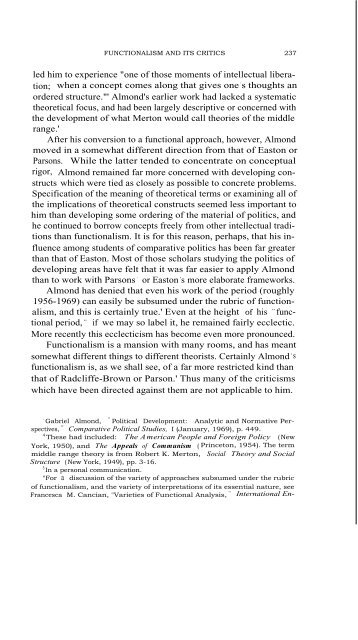FUNCTIONALISM AND ITS CRITICS - Intercollegiate Studies Institute
FUNCTIONALISM AND ITS CRITICS - Intercollegiate Studies Institute
FUNCTIONALISM AND ITS CRITICS - Intercollegiate Studies Institute
Create successful ePaper yourself
Turn your PDF publications into a flip-book with our unique Google optimized e-Paper software.
<strong>FUNCTIONALISM</strong> <strong>AND</strong> <strong>ITS</strong> <strong>CRITICS</strong> 237<br />
led him to experience "one of those moments of intellectual liberation;<br />
when a concept comes along that gives one ' s thoughts an<br />
ordered structure."' Almond's earlier work had lacked a systematic<br />
theoretical focus, and had been largely descriptive or concerned with<br />
the development of what Merton would call theories of the middle<br />
range.'<br />
After his conversion to a functional approach, however, Almond<br />
moved in a somewhat different direction from that of Easton or<br />
Parsons. While the latter tended to concentrate on conceptual<br />
rigor, Almond remained far more concerned with developing constructs<br />
which were tied as closely as possible to concrete problems.<br />
Specification of the meaning of theoretical terms or examining all of<br />
the implications of theoretical constructs seemed less important to<br />
him than developing some ordering of the material of politics, and<br />
he continued to borrow concepts freely from other intellectual traditions<br />
than functionalism. It is for this reason, perhaps, that his influence<br />
among students of comparative politics has been far greater<br />
than that of Easton. Most of those scholars studying the politics of<br />
developing areas have felt that it was far easier to apply Almond<br />
than to work with Parsons ' or Easton ' s more elaborate frameworks.<br />
Almond has denied that even his work of the period (roughly<br />
1956-1969) can easily be subsumed under the rubric of functionalism,<br />
and this is certainly true.' Even at the height of his " functional<br />
period, " if we may so label it, he remained fairly ecclectic.<br />
More recently this ecclecticism has become even more pronounced.<br />
Functionalism is a mansion with many rooms, and has meant<br />
somewhat different things to different theorists. Certainly Almond ' s<br />
functionalism is, as we shall see, of a far more restricted kind than<br />
that of Radcliffe-Brown or Parson.' Thus many of the criticisms<br />
which have been directed against them are not applicable to him.<br />
' Gabriel Almond,<br />
"<br />
Political Development: Analytic and Normative Perspectives,<br />
" Comparative Political <strong>Studies</strong>, I (January, 1969), p. 449.<br />
4<br />
These had included: The American People and Foreign Policy ( New<br />
York, 1950), and The Appeals of Communism ( Princeton, 1954). The term<br />
middle range theory is from Robert K. Merton,<br />
Structure ( New York, 1949), pp. 3-16.<br />
5<br />
In a personal communication.<br />
Social Theory and Social<br />
°For a discussion of the variety of approaches subsumed under the rubric<br />
of functionalism, and the variety of interpretations of its essential nature, see<br />
Francesca M. Cancian, "Varieties of Functional Analysis, " International En-
















